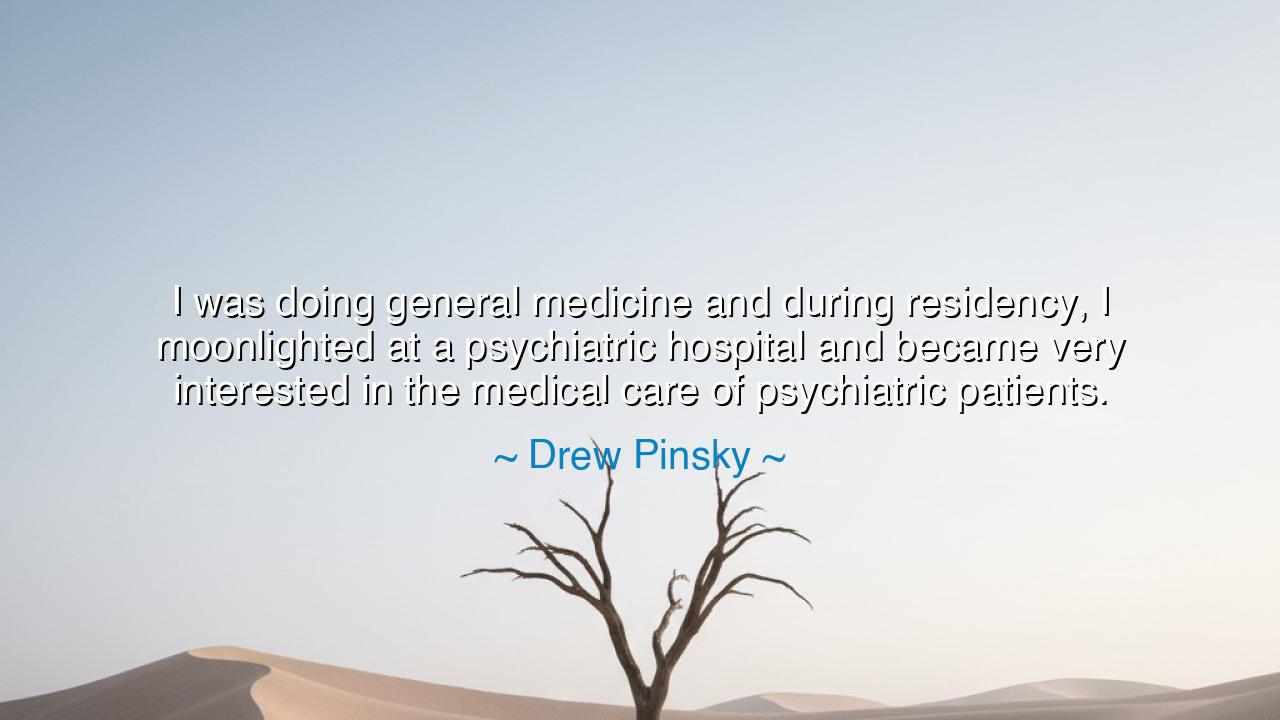
I was doing general medicine and during residency, I moonlighted
I was doing general medicine and during residency, I moonlighted at a psychiatric hospital and became very interested in the medical care of psychiatric patients.






The words of Drew Pinsky — “I was doing general medicine and during residency, I moonlighted at a psychiatric hospital and became very interested in the medical care of psychiatric patients” — are not merely a recollection of a career path. They are a revelation about the unity between the body and the mind, between medicine and the unseen suffering of the soul. In these words lies the echo of an ancient truth — that to heal one aspect of a human being, one must understand the whole. For Pinsky, a man trained in the science of the body, found himself drawn into the realm of the spirit — where wounds bleed not upon the skin but within the silence of thought.
In the great halls of medicine, young healers often learn to listen to the body’s voice — the pulse, the breath, the tremor of organs unseen. Yet few are taught to listen to the cry of the mind. When Pinsky entered that psychiatric hospital, he stepped across the boundary that so many doctors fear to cross: the threshold between physical ailment and invisible despair. There he learned that a patient’s suffering could not be confined to the chart, nor the lab result, nor the diagnosis. He learned that the heart and the mind dance together, and that illness in one can cast a shadow upon the other. His curiosity became compassion, and his compassion became calling.
History, too, remembers others who made this sacred journey. In the seventeenth century, Thomas Willis, a physician of Oxford, broke from the cold traditions of his peers to study the connection between the brain and emotion. He dared to claim that melancholy, madness, and despair were not sins nor spirits, but conditions of the body intertwined with the soul. For this he was mocked by the learned men of his day — yet time would prove him right. Pinsky’s journey mirrors Willis’s: the discovery that the healer’s task is not to divide, but to unite, to mend the bridge between reason and feeling, flesh and thought.
What Pinsky saw among psychiatric patients was not merely disorder — it was humanity at its most fragile. He saw the man whose trembling was mistaken for fear but born from illness; the woman whose tears were blamed on weakness but caused by imbalance; the young soul trapped in a storm of thoughts that medicine alone could not calm. From these encounters, the physician’s role changed: from scientist to witness, from mechanic of the body to shepherd of the whole being. His fascination was not with madness, but with meaning — the meaning of suffering, and the grace of understanding it.
There is a story told of a doctor in ancient China who was said to heal not with herbs or needles, but with listening. He would sit beside his patients for hours, hearing their tales of sorrow, loss, and fear, before ever touching their pulse. And when he did, he would whisper, “Now I know where your illness lives.” Such was the spirit Pinsky discovered in his moonlit nights — that to treat a person’s mind, one must first see them as whole, not as a collection of symptoms but as a being yearning for harmony.
In a deeper sense, Pinsky’s words also remind us of the transformative power of curiosity. It was curiosity — a restless yearning to understand — that guided him from the comfort of routine medicine into the mystery of the human psyche. Many walk the same road of habit, never venturing beyond what they know. Yet those who dare to follow wonder where it leads often find their true vocation. The lesson is clear: the path of the healer, or of any seeker, begins when one steps beyond comfort, guided by compassion for what one does not yet understand.
So let this teaching be carried forward: wherever you serve, in whatever craft or purpose, do not turn away from the unseen suffering of others. The greatest callings often appear in the quiet places where others do not look — in the hospital ward at midnight, in the trembling hand of a patient, in the eyes of one forgotten. Pinsky’s story is not only that of a doctor — it is the story of all who awaken to a higher purpose through empathy. And if we, too, learn to listen with both intellect and heart, we may heal not only others, but ourselves.
Thus, the legacy of Drew Pinsky’s discovery stands as a modern echo of ancient wisdom: that medicine without compassion is cold, and compassion without understanding is blind. To unite them is the true art of healing — the divine work of restoring harmony to the living soul.






AAdministratorAdministrator
Welcome, honored guests. Please leave a comment, we will respond soon